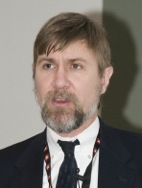
MENU
STIDS 2014 Home
About--
Topic list
Program Cmte
Venue & Local Info
Registration
Sponsors
Program--
Keynote Speakers
Tutorials
Best Paper Award
Agenda & Papers
Download Agenda
Proceedings
Call for Papers
Important dates
Submission details
Classified Session
Download CFP
C4I
Home

SEMANTIC
TECHNOLOGY FOR
INTELLIGENCE,
DEFENSE, AND
SECURITY
|
Dr. Mark Greaves
Date
Title
|

|
One of the most technically promising areas for semantic technology has been in accelerating the process of scientific discovery. Like the STIDS community, the general scientific community has struggled with needing to combine and understand data in support of modeling and data analytics. Semantic technology is frequently part of the answer. However, advanced scientific information processing systems have gone beyond supporting data integration and modeling, to attempt to directly assist scientists in creating and testing hypotheses. In this talk, I will discuss some new developments and challenges in AI systems that support scientific discovery.
I will also discuss several parallels to the concerns of the STIDS community, and conclude with some lessons.
Mark Greaves is currently Technical Director for Analytics in
the National Security Directorate of the US Department of Energy's Pacific Northwest National Laboratory, providing
scientific, programmatic, and business development leadership. At PNNL, he works with national security clients
and cutting-edge PNNL scientific teams to advance the nation's overall capability for extracting meaning from large
heterogeneous data sets.
Previously, Mark was Director of Knowledge Systems at Vulcan Inc., the private asset management company for Paul Allen,
where he led advanced research teams in large knowledge bases and semantic web technologies, including semantic
wikis and data- intensive artificial intelligence technologies. He also served as Vice President of the Allen
Institute for Artificial Intelligence, which supports individual researchers and research groups that have the
promise to dramatically accelerate progress in artificial intelligence. Prior to Vulcan, Mark was Director of DARPA's
Joint Logistics Technology Office, and Program Manager in DARPA's Information Exploitation Office. At DARPA, he
directed national research programs in semantic web technology, formal ontology specification, logistics and supply
chain control technologies, and the application of software agent technology to problems of distributed control of
complex systems-of-systems. In May of 2005, he was awarded the Office of the Secretary of Defense Medal for
Exceptional Public Service for his contributions to US national security while serving at DARPA.
Prior to coming to DARPA, Mark worked on advanced programs in software agent technology at the Mathematics and
Computing Technology group of Boeing. He has published two books and over 20 papers, holds two patents, chaired
the FIPA technical committee on agent communications languages, and from 2001 to 2004 served as co- chair of the
Joint Readiness and Sustainment of Strategic Systems chapter of the Defense Joint Warfighting Science and Technology
Plan. He currently serves on the Advisory Boards of several Semantic Web-oriented organizations, and is a Fellow
of the Semantic Technology Institute. Mark holds a PhD in Philosophy from Stanford University.
|
Dr. Heather McCallum-Bayliss
Date
Title
|

|
Exploring new types of knowledge that can be extracted from on-line data is crucially important to US intelligence, defense and security concerns. In general, we continue to move existing technologies into different corners and aspects of the data world but we have not explored very successfully the development of technologies that tackle the areas of cognition and social interaction. Inferring behaviors and intentions is currently dependent on external criteria or ontologies but there is often little motivation or evidence. Two IARPA programs have ventured into uncharted territories by attempting to determine if on-line data have more to reveal than we have considered. The SCIL Program is based on the hypothesis that automated systems can identify the strategies that people interacting in on-line groups use to establish their social roles and signal their social intentions by examining the language they use. The Metaphor Program is based on the hypothesis that automated systems can reveal the underlying beliefs and worldviews of cultures by examining their use of metaphorical language. The talk will delve into the status and results of these research efforts. Information about IARPA, the goals of the organization and principles that guide research programs will also be introduced.
Heather McCallum-Bayliss received her Ph.D. in Theoretical
Linguistics from Georgetown University. She taught at Georgetown for seven years before moving to a research
firm that focused on the development of human language technology systems with particular focus on systems
for multilingual and multicultural name-searching. This work resulted in a patent for a phonologically based,
multicultural name-search system. Since 2003, Dr. McCallum-Bayliss has defined and managed advanced multilingual
research programs at the ODNI (Office of the Director of National Intelligence)'s Intelligence Advanced
Research Projects Activity (IARPA) and its predecessor organizations. These efforts have produced
automated question-answering systems as well as systems that tackle the use of language for characterization
of social and cultural meaning and understanding. Dr. McCallum-Bayliss continues at IARPA as the
Program Manager for the Metaphor and SCIL Programs.
|
Dr. Jeffrey Morrison
Date
Title |
 |
The science & technology community faces a challenge – and an opportunity. Much research has addressed helping decision makers “Know what they Know”. We now need to think about helping decision makers in making decisions with incomplete, or imperfect information, i.e. making decisions in uncertainty. The semantic technology should play a key role in There is an urgent need to find ways to address this challenge. Many DOD mission areas need to Maximize the Impact of Limited Operational Assets allocated within a dynamic and uncertain “targeting” environment. This presentation will propose a number of questions, including: Research is needed that takes a different direction from much of the work with uncertainty to date. Rather than developing estimates of uncertainty, what is needed are decision support tools to optimize decision making despite uncertainties. Insights will be provided on the role of Uncertainty in the “targeting” process for targeteers, mission planners, and watchstanders to determine when & how to task operational assets. The Office of Naval Research has begun several projects to understand operational requirements for making decisions in uncertainty for Navy operations, and representative decision support concepts, and modelling efforts currently being developed are described.
Dr. Jeffrey G. Morrison joined ONR’s Human &
Bioengineered Systems Department (341) as a Program Officer in January, 2011 where he leads the Command Decision
Making (CDM) program. The program is conducting Basic & Applied cognitive science research for application
to individual & group decision making. The current operational focus is on multi-echelon Command & Control.
The science focus is on developing Proactive Decision Support tools (PDS) that are aware of mission and tasks
context as well as the facilitating the development of a science of Context-Driven Decision Making (CDDM). Prior to coming to ONR, Dr. Morrison was a Engineering Psychologist / Cognitive Scientist with the Space
and Naval Warfare Systems Center--Pacific (SSC Pacific) for 17 years. He was most recently embedded as a Navy
Scientist with the Combating Terrorism Technical Support Office (CTTSO) where he served as Chief Scientist to
the ASD RDT&E sponsored Human Social Culture and Behavior Modeling Program (HSCB). During 2007-2008,
Dr. Morrison was detailed to the Director of National Intelligence where he served as an IARPA Program Manager
studying the analytic process and the potential application of virtual world technologies to enable it.
Dr. Morrison was a senior scientist supporting several DARPA projects, including the development of
user-composable automation for Maritime Domain Awareness (FastC2AP), Predictive Analysis for Naval Deployment
Activity (PANDA), and the Augmented Cognition program. He also was principle investigator for numerous ONR
sponsored projects, including: Knowledge Web (K-Web), and Tactical Decision Making Under Stress (TADMUS). Dr. Morrison has been the recipient of numerous professional awards including: The 2005 Jerome H Ely
Award for Article of the Year in the Journal of Human Factors; the 2004 ONR Arthur E. Bisson Prize for
Naval Technology Achievement; and the American Psychological Association--Division 21, George E. Briggs
Award for Original Research.
